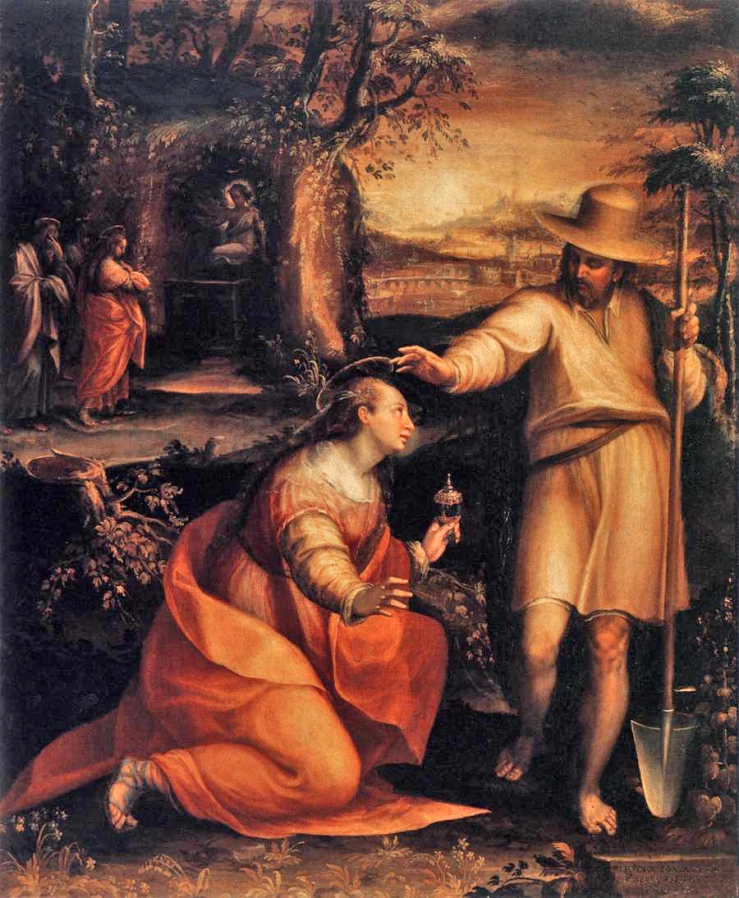What If God Is a Gardener?
 “With a potent winter storm now behind us here in West Michigan, a fresh blanket of early February snow sits ten inches deep in my backyard. This hardly seems like the time to think of gardening.
“With a potent winter storm now behind us here in West Michigan, a fresh blanket of early February snow sits ten inches deep in my backyard. This hardly seems like the time to think of gardening.Yet it won’t be much longer. Already the sun is rising earlier and setting almost an hour later than on winter’s darkest day. Longer, brighter days are encroaching. The snow will melt, the soil will warm, and growing things will appear. And gardeners will plant their seeds.
Seeds are like faith. To plant a seed is to sow the substance of living color and fruitfulness. And it’s to express confidence that the act of planting something so small it seems almost nothing makes all the difference. Because from the very beginning, God decreed that within humble seeds would reside the mysterious, exponential power of reproduction.
Then God said, “Let the land produce vegetation: seed-bearing plants and trees on the land that bear fruit with seed in it, according to their various kinds.” And it was so. The land produced vegetation: plants bearing seed according to their kinds and trees bearing fruit with seed in it according to their kinds. And God saw that it was good. (Genesis 1:11–12)
God is a gardener at heart. In Eden he planted a garden—the sublimest of all art galleries, a landscape filled with living, growing sculptures. Humanity was to be its caretakers. And seed was its means of self-sustenance. God loves seeds.
Within a single seed are all the components that will develop, over time and in the right conditions, into the living thing the seed came from and is intended to perpetuate. Every seed is a latent rose, or a maple, a healing herb, a kingly sequoia . . . and something more, something deeper. Within a seed, Jesus told his disciples, resides the key to understanding the kingdom of heaven.
He taught [the people] many things by parables, and in his teaching said: “Listen! A farmer went out to sow his seed . . .” (Mark 4:2–3)
You know the rest—how some of the seed fell along the path, some on rocky ground, some among thorns, and some on good soil; and how the seed fared differently in each case.
The disciples were mystified. What was Jesus getting at? “Explain it to us,” they requested later when they were alone with him.
“Don’t you understand this parable?” Jesus responded. “How then will you understand any parable?” (Mark 4:13)
In other words, this parable is foundational. Indeed, in all three synoptic gospels, it is the first of all the seed parables, and there are a number of them. Because the kingdom of God operates like a seed. Not a product with packaged parts and instructions for assembly, but a tiny fleck imbued with the blessing and mystery of life.
“This is what the kingdom of God is like. A man scatters seed on the ground. Night and day, whether he sleeps or gets up, the seed sprouts and grows, though he does not know how. All by itself the soil produces grain—first the stalk, then the head, then the full kernel in the head.” (Mark 4:26–28)
“The kingdom of heaven is like a mustard seed, which a man took and planted in his field. Though it is the smallest of all seeds, yet when it grows, it is the largest of garden plants and becomes a tree, so that the birds come and perch in its branches.” (Matthew 13:31–32)
A seed implies patience. It doesn’t replicate overnight, doesn’t unfold everything it contains in a day. Apparently God, the Master Gardener, values the process of germination, growth, and maturation rather than immediate results. That’s how it is in the plant kingdom, and so it is in his kingdom.
In you and me.
We have been “born again, not of perishable seed, but of imperishable, through the living and enduring word of God” (1 Peter 1:23). The Word sown in our heart by the Gardener has germinated, transforming us into a new creation in place of the old (2 Corinthians 5:17).
But that new creation, like a plant, takes time to grow. So be gentle with yourself. There are things you can do, and need to do, in order to cultivate God’s kingdom within you and through you. But a large part of the matter is to simply treat your relationship with God as just that: a relationship. A connection and a conversation. An organic interaction with Someone who is always with you, who loves you more than you can imagine, and who is keenly devoted to the growth of his seed in you. Because that’s what it is—his seed. Seed destined to mature into something very, very good. Trust in him to help you grow it—to grow you day by day, season by season, into the reflection of God you are created to be.